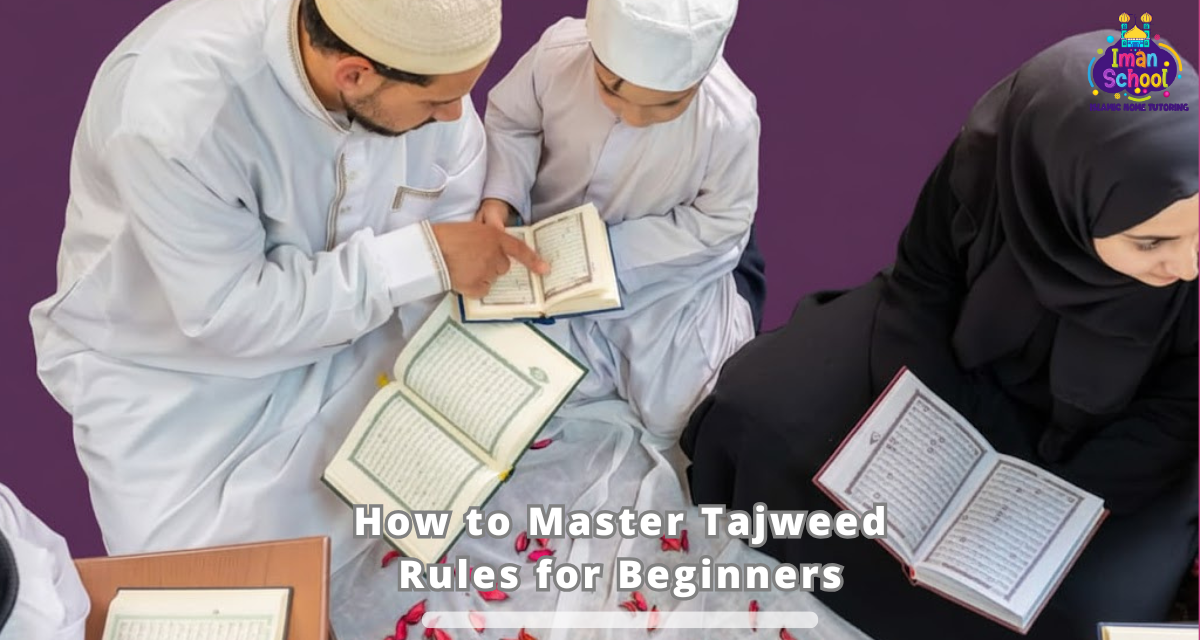Welcome to the journey of perfecting your connection with the Quran! As a beginner, you may find the rules of pronunciation and recitation daunting, but mastering them is entirely achievable. This guide is designed to simplify the complex and show you How to Master Tajweed Rules for Beginners.
What is the first step in learning Tajweed?
The first and most critical step in learning Tajweed Rules for Beginners is not memorizing the rules themselves, but mastering the Noorani Qaida online. The Noorani Qaida is a foundational booklet designed specifically for Tajweed rules for non-Arabs and children. It teaches you how to pronounce every single Arabic letter correctly, how letters join together, and the basic rules of vowels and signs.
Without a solid foundation from the Noorani Qaida online, attempting to grasp complex rules like Noon Sakinah or Madd will be difficult. Dedicate time to mastering this step first. It is the easiest way to learn Tajweed and essential for setting your recitation on the correct path.

How to Master Tajweed Rules for Beginners: Focusing on Makharij (Articulation Points)?
The Makharij of letters for beginners the specific places in the mouth and throat where the sound of an Arabic letter originates are the cornerstone of all Tajweed Rules for Beginners. Focusing on Makharij is crucial because if a letter is pronounced incorrectly, it can change the meaning of the word entirely (a major Lahn or mistake).
-
Identify the Source: Learn the five main areas of articulation (Throat, Tongue, Lips, Nasal Passage, and Empty Space).
-
Practice Pairs: Focus on letters that sound similar to non-Arabs
-
Repetition: Use flashcards or an online Tajweed classes for beginners tutor to repeat difficult letters hundreds of times until the correct articulation becomes natural.
Mastering the Makharij of letters for beginners is non-negotiable for anyone who wants to learn how to read Quran with Tajweed.
What is the easiest way to learn Noon Sakinah and Tanween rules?
The rules of Noon Sakinah (silent Noon) and Tanween (double Fathah, Dammah, or Kasrah) are often the first major challenge encountered when students advance beyond the basic Tajweed rules explained. There are four main rules: Izhar, Idgham, Iqlab, and Ikhfa.
The easiest way to learn Tajweed here is not by memorizing the four rule names, but by memorizing the letters that follow the Noon or Tanween. For instance:
-
Izhar (Clarity): Memorize the six throat letters. If any of them follow Noon Sakinah, the Noon is pronounced clearly.
-
Idgham (Merging): Memorize the letters of the word (Yarmaloon). If any of these follow, the Noon merges into the next letter.
Start practicing with short surahs with Tajweed (like Al-Fatiha or Al-Ikhlas) which contain many examples of the Noon Sakinah rules made easy. Consistent Tajweed practice tips will make these feel intuitive.
How can I practice Madd (Elongation) correctly as a beginner?
Madd (Elongation) is essential, as incorrect elongation is one of the most common Tajweed mistakes non-Arabs make. The fundamental rule is to elongate the vowel sound (a, i, u) when followed by specific letters (Alif, Waw, or Yaa).
As a beginner, focus on the two main types:
-
Natural Madd: Elongate by two counts. This is the simplest rule.
-
Connected/Separated Madd: Recognize when a Madd is followed by a Hamzah. These require 4 or 5 counts.
Use the ticking of a clock or your fingers to count the beats precisely. Precision is key when you learn Tajweed rules easy.
How to check if my basic Tajweed is correct?
Online Quran and Tajweed Courses are the most effective way to check your basic Tajweed. Reading from a book or using a Tajweed apps for beginners can only teach the theory.
Only a qualified teacher can listen to your recitation and provide immediate correction on the subtle sounds of the Makharij and the duration of the Madd. Self-correction using Tajweed apps for beginners is beneficial, but live feedback is indispensable for how to fix Tajweed mistakes.
Is it better to memorize rules or practice recitation more?
For Tajweed Rules for Beginners, practice always takes precedence over rote memorization. The core goal of what are the rules of Tajweed is to improve the recitation, not to pass a written exam.
You should memorize the basic Tajweed rules explained only enough to recognize the rule when you see it, and then spend 90% of your study time applying the rules while reading the Qur'an. Consistent Tajweed practice tips should involve slow, deliberate recitation.

Why is a qualified teacher crucial for beginner Tajweed?
A qualified teacher is not just helpful; they are crucial, particularly for Tajweed rules for non-Arabs. They can:
-
Hear Errors: Identify subtle errors in Makharij that you cannot hear yourself.
-
Give Ijazah: Ultimately certify your recitation is correct.
-
Provide Context: Explain the Tajweed rules in English clearly and simply.
The teacher ensures you are truly learning how to Master Tajweed Rules for Beginners according to the riwayah (narration) of the Prophet (PBUH). You should actively seek out a certified quran teacher near me (or online).
Why Choose Iman School to Master Tajweed Rules?
If you are serious about moving beyond the beginner Tajweed course stage, Iman School offers the ultimate solution. We recognize the unique difficulties faced by those looking to learn Tajweed online free or cheap and provide a superior, structured alternative.
Our curriculum is tailored for non-native speakers, making complex rules understandable and practical. We focus on applying the basic Tajweed rules explained from the very first session.
Our Specialized 'Beginner-to-Fluent' Tajweed Curriculum
Our online Tajweed classes for beginners start with a deep dive into the Makharij and the Noorani Qaida online. The curriculum then systematically moves through all the rules of Noon Sakinah, Madd, Qalqalah, and advanced Idgham, ensuring a seamless progression.
Students receive one-on-one attention, ensuring their pronunciation adheres strictly to the authentic riwayah of Hafs from Asim. We don't just teach the rules; we teach you how to Master Tajweed Rules for Beginners with confidence and beauty.
FAQs about Tajweed Rules for Beginners
How long does it take a beginner to learn basic Tajweed rules?
With consistent practice (4 to 5 times a week with a tutor), a motivated beginner can master the basic Tajweed rules explained (Makharij, simple Madd, and Noon Sakinah) within 3 to 6 months. Achieving fluent, error-free application requires ongoing Tajweed practice tips and years of reading.
What are the two major mistakes (Lahn) in Tajweed?
The two major mistakes are Lahn Jalī (obvious mistake) and Lahn Khafī (hidden mistake). Lahn Jalī is the major error that changes the meaning of the word (e.g., mispronouncing a Makhraj or changing the vowel length of a Madd), and this must be avoided, as is Tajweed mandatory for the prayer to be acceptable.
Do I need to know Arabic grammar to start learning Tajweed?
No, you do not need to know Arabic grammar to start learning Tajweed Rules for Beginners. Tajweed focuses solely on pronunciation, not word meanings or sentence structure. This is why Iman School offers simultaneous Arabic language courses alongside their beginner Tajweed course. It helps, but it is not required for the initial stage.
The Best Online Quran and Tajweed Academy
Iman School is the best online Quran and Tajweed academy. We provide certified, one-on-one instruction tailored to non-Arabic speakers. Our comprehensive online courses cover:
-
Quran Interpretation (Tafsir)
-
Advanced Tajweed
-
Arabic Language (Conversational and Classical)
-
Islamic History
-
Islamic Manners (Adab)
-
Jurisprudence, Creed, and Sharia (Fiqh and Aqeedah)
- Hadith and Seerah (Prophetic Biography)




